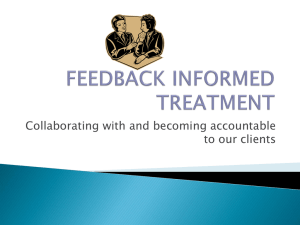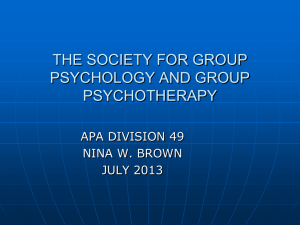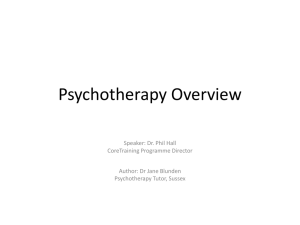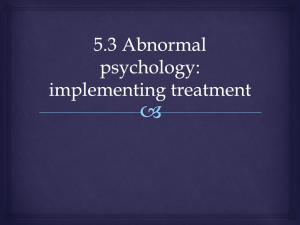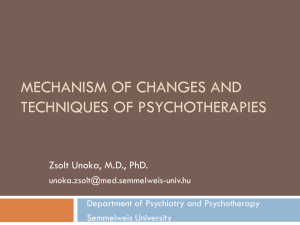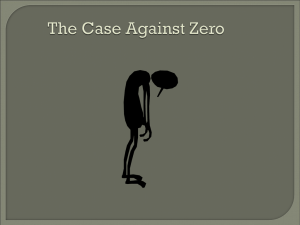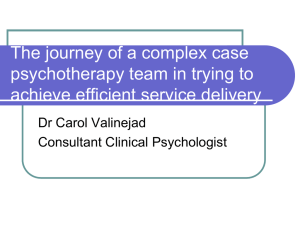Psychotherapy regulation for dummies (and the
advertisement
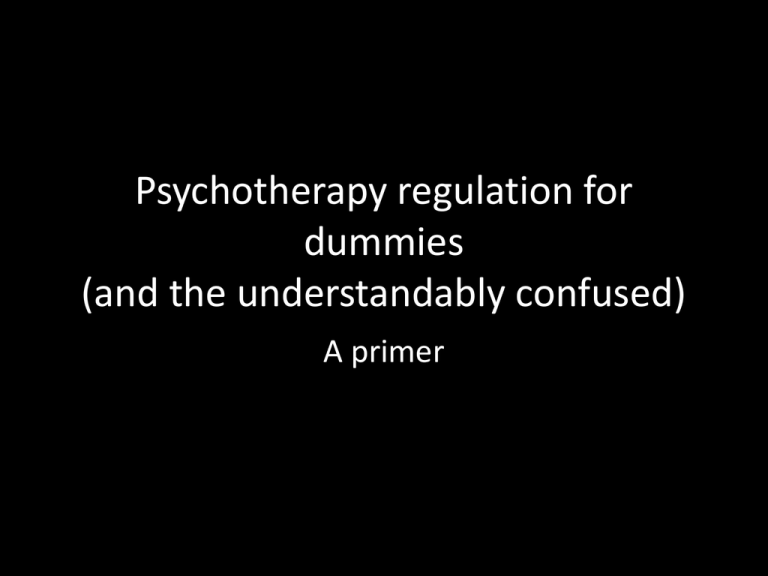
Psychotherapy regulation for dummies (and the understandably confused) A primer Psychotherapy Regulation for Dummies • • • • Brenda Spitzer, M.Sc., RMFT Ed Santana, MA, PhD (C) Anna Toth, M.Sc., RMFT Ron Mellish, MA, RMFT, CTS What is regulation anyway? • Psychotherapy will be regulated under the Regulated Health Professions Act (RHPA, 1991) to govern and hold professionals delivering psychotherapy services accountable. • Schedule R of the RHPA, also called Bill 171 became law in 2007 and is called The Psychotherapy Act. The Psychotherapy Act • The Psychotherapy Act identifies the practice of psychotherapy as a controlled act, legally deliverable only by those registered in the Colleges of Medicine, Nursing, Psychology, Social Work, Occupational Therapy, or the new College of Registered Psychotherapists and Registered Mental Health Therapists (the College). The Psychotherapy Act • The Psychotherapy Act defines the controlled act of psychotherapy as: “treating, by means of psychotherapy technique, delivered through a therapeutic relationship, an individual’s serious disorder of thought, cognition, mood, emotional regulation, perception or memory that may seriously impair the individual’s judgement, insight, behaviour, communication or social functioning” The Psychotherapy Act • The Act defines the scope of practice of Psychotherapy as “the assessment and treatment of cognitive, emotional or behavioural disturbances by psychotherapeutic means, delivered through a therapeutic relationship based on verbal or non-verbal communication” The new College • The Psychotherapy Act restricts the use of the titles “psychotherapist” and “registered mental health therapist” to members of the College. • The College will be operational once the Psychotherapy Act is proclaimed (in 2014). At this time, anyone wishing to hold the title “psychotherapist” or “registered mental health therapist” will need to be registered in the College. The new College • The College will be governed by a Council, and will oversee three psychotherapy regulations: the Draft Registration Regulations, Professional Misconduct Regulations, and Quality Assurance Regulations. • The regulations define and describe who is eligible to join the college, practice parameters, what legally constitutes professional misconduct, and guidelines for addressing identified professional shortcomings. What’s the relationship between membership in the new College and membership in the OAMFT? The new College • To practice psychotherapy as defined by the Psychotherapy Act, membership in the new College will be obligatory. • The only mandate and goal of a Professional College is protection of the public. • The College will control entrance requirements, will set exams for those wishing to practice, will set standards for developing and maintaining professional knowledge and will have the power to discipline members in various ways including removing their right to practice. The new College & O/AAMFT • OAMFT is a professional association whose mandate is to act in the interest of its members. • A professional association is voluntary. • Professional associations advocate on behalf of their members, provide services for members such as liability insurance, create marketing opportunities, professional development and networking opportunities. The new College & O/AAMFT • OAMFT, as a professional association supports its members in the pursuit of competent and ethical service to clients. • The registered marriage and family therapist designation (“RMFT”) is a voluntary professional designation to describe an AAMFT Clinical Fellow’s attained level of education, orientation and training. Recent developments and OAMFT lobbying efforts • Lobbying Efforts 2010-2012: Transitional Council, Ministry of Health, Coalition, OACCPP/OASW • OAMFT Successes: Title Usage, RMHTs restricted practice, Misconduct Regulations • Ongoing and Upcoming Initiatives: Credentialing Standards, Supervision, Exam, and RMHT Restrictions Required hours of education for professional designation as a psychotherapist 1000 900 800 700 600 500 400 300 200 100 0 900 900 870 900 900 720 360 Master’s Degree Without a higher education and training threshold, Ontario’s standards will fall well below Canadian and International professional standards, putting the safety of patients receiving these important services at risk. Quebec: Social Worker/Marriage & Family Therapist; Minimum creden al is a Master's degree, equal to approximately 900 hours of instruc on (or 60-semester credit hours) to obtain a degree in a non-thesis program. *Based on a typical qualifying Master's program at an approved ins tu on without thesis, and with prac ca, not including addi onal course requirements or direct client contact hour requirements of the Quebec Order of Social Workers/MFTs. Nova Sco a: Registered Counselling Therapist (RCT), Minimum creden al is a Master's degree of approximately 720 hours of instruc on (or 48-semester credit hours). New York: Mental Health Prac oner, Minimum creden al is a Master's degree of approximately 900 hours of instruc on (or 60-semester credit hours). California: Licensed Professional Clinical Counsellor, Minimum creden al is a Master's degree of approximately 870 hours of instruc on (or 48-semester credit hours plus addi onal prac cum of 150 hours). Maryland: Licensed Professional Counsellor, Minimum creden al is a Master's degree of approximately 900 hours of instruc on (or 60-semester credit hours). Florida: Mental Health Counsellor, Minimum creden al is a Master's degree of approximately 900 hours of instruc on (or 60-semester credit hours). *(1 semester credit hour = approximately 15hours of classroom instruc on) Recent developments and OAMFT lobbying efforts • Lobbying at Queen's Park: NDP, PCs, Liberal and Ministry of Health • Next Steps: Change of Players, Final Version of Misconduct Rules, Changes to Registration Regulations • Thanks to OAMFT Members and Leaders: We are making a difference! Understanding the Misconduct Regulations And why we don’t need to panic What is the difference between the AAMFT Code of Ethics, the College’s Code of Ethics, and the Misconduct Regulations? AAMFT Code of Ethics • Sets standards of professional practice and conduct that members agree to uphold • Broad application to promote pubic trust, protect clients, supervisees, students, and research participants • Code items may exceed legal expectations • Conversely legal expectations may exceed the Code • Contravention is investigated and disciplined by a committee of AAMFT • Ultimate discipline = permanent loss of membership • Tends to be written in a language of “MFT’s do” Code of Ethics of the new College • Inspirational document • Offers what the College sees as a preferred way to embody an ethical stance • Focused on clients • Not legally binding • Tends to be written more in the language of “we strive to” Misconduct Regulations • Subsection of Psychotherapy Act, 2007 that defines acts of professional misconduct and processes by which new College will investigate and discipline members who engage in such acts • Legally binding • Focused on clients only; no protection of supervisees, research participants, students…. • Tends to be written in the language of “failure to” Misconduct Regulations Key areas of focus …and why we still don’t need to panic Contravening practice standards • Contravening, by act or omission, a standard of the practice of the profession or failing to maintain the standard of practice of the profession (standards can be explicit or implicit) Failing to obtain informed consent • Doing anything to a client for a therapeutic, preventive, palliative, diagnostic or other health-related purpose except, – With the informed consent of the client or their representative – As required or authorized by law • MFT’s need to be familiar with the health care consent act, particularly sections 10 & 11 Health Care Consent Act, 1996 Sections 10 & 11 • We need to be of the opinion that the person is capable of consent and is giving consent, or we need to have the consent of a substitute decision maker – Consent must be voluntary – Consent cannot be obtained through misrepresentation or fraud – Consent must be informed • Client must receive information that any reasonable person in the same circumstances would require to make a decision • Client received responses to his/her requests for additional information • Consent to treatment may be express or implied • If a client requests information about the risks of treatment, they must be informed Health Care Consent Act, 1996 • Clients need to be informed about: – Nature of treatment – Expected benefits – Materials risks – Material side effects – Alternative courses of action – The likely consequences of not having the treatment Confidentiality • While always a hallmark of our services, it too has now been codified into law • Personal Health Information Protection Act, 2004 Discontinuing Services • Unless the discontinuation would be reasonably regarded as necessary due to: – Member’s reasons for discontinuing – The condition of the client – The availability of other services – The opportunity given to the client to arrange alternate services – Including closing your practice voluntarily or due to death or disability Unnecessary treatment • Recommending or providing unnecessary treatment • Treating clients when treatment is no longer working or beneficial • Treating conditions that you know or ought to know you do not have the knowledge, skills or judgment to treat • Performing acts that you are not authorized to perform Working with and consulting other service providers • Now more of an onus on therapists to work with other health care professionals • Failing to advise a client to consult • Failing to work with other health care providers when necessary • Failing to refer when we know a referral is needed • Delegating the authorized act except under certain circumstances • Permitting a service provider to misrepresent themselves Complaints processes and disciplinary procedures • Failing to advise a client of their right to complain • Failing to provide the address and telephone number of the College • Various forms of failing to participate in the College’s complaints processes in a timely fashion • Failing to comply with disciplinary procedures • Practicing when your registration has been suspended • Benefitting from someone else’s practice when your registration has been suspended Conflict of interest and undue influence • Working when we are in a conflict of interest position • Influencing clients to change their will Billing, fees and finances • Issuing bills and invoices that a member knows or ought to know are false or misleading • Charging a fee that is excessive • Charging more than the usual fee when billing a third party • Failing to advise a client of penalties for late payment etcetera • Charging block fees without specifying certain aspects of the fee in writing • Offering or giving reductions for prompt payment of accounts • Failing to itemize accounts when requested to do so • Breaching contracts with a client relating to services or fees • Selling debts Record Keeping • Failing to keep written records in accordance with the standards of the profession (more to come) • Signing or issuing documents that the member knows or ought to know are false or misleading • Falsifying records • The transitional council, in earlier drafts of the misconduct regulations, articulated what constituted appropriate written documents • These will likely come out as specific guidelines or policies within the next year Advertising • Making claims about approaches, modalities, procedures, etcetera that cannot be supported by professional opinion • Permitting advertising that is false or misleading or that includes statements that are not verifiable • Using testimonials in advertising • Soliciting or permitting solicitations by phone or electronic communication except under certain conditions Title, designations and names • Inappropriately using terms, titles or designations • Inappropriately using terms, titles or designations to imply specializations in the profession • Failing to use the title designated by the college while acting in a professional capacity • Practicing the profession using another name (members are allowed to use business names, but their documentation, receipts etcetera must use their personal name as they are registered with the college) • Failing to provide certificates of authorization to perform the service Jane Doe, M.Sc., RP, RMFT, CTS Reporting other members • Failing to promptly report members who engage in unsafe practices • Making a report about another member in which you use the name of the client, unless appropriate consent has been obtained or it is required by law Contravening a variety of laws • Regulated health professions act • Any law in Canada the purpose of which is to protect the public or is relevant to our suitability to practice Providing services through electronic communication • Unless – The client provides informed consent – The member ensures their professional liability insurance covers the services – The member takes reasonable steps to ensure the electronic communication technology employed is secure, confidential and appropriate… Generally doing bad things • Abusing a client or their representative • Practicing while impaired by any condition or substance that you know or ought reasonably to know would impair you • Committing acts that would be reasonably regarded as disgraceful, dishonourable or unprofessional • Generally engaging in conduct unbecoming as a member To keep in mind • MFT’s remain accountable to both the AAMFT Code of Ethics and the Misconduct Regulations • When there is discrepancy between the two… – Make sure the law is followed – Choose the higher ethical practice – Consult consult consult Registration …because you have to http://www.collegeofpsychotherapists.on.ca/pages/ Home http://www.collegeofpsychotherapists.on.ca/ pages/Home/Info_for_Applicants
